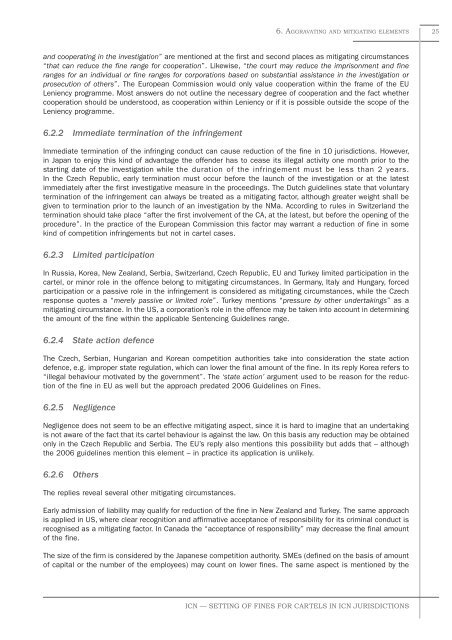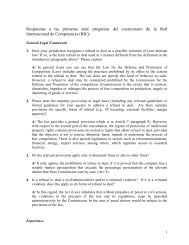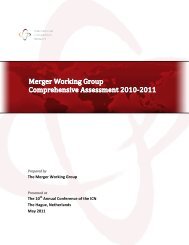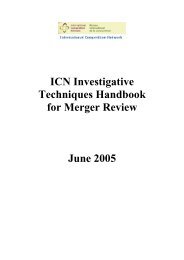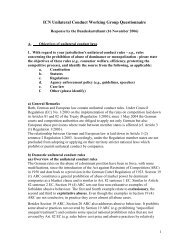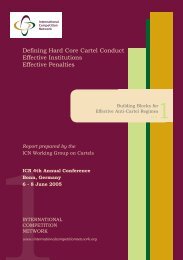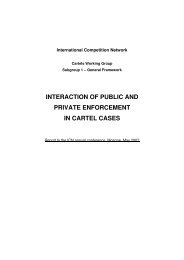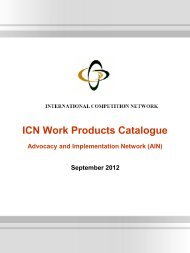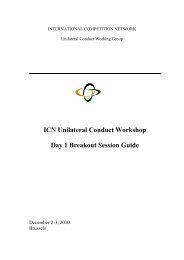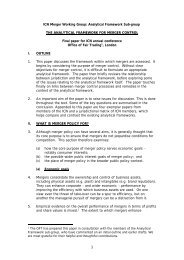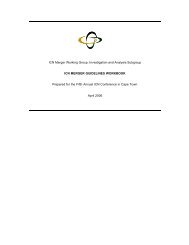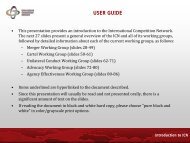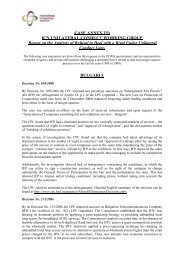Setting of Fines for Cartels in ICN Jurisdictions - International ...
Setting of Fines for Cartels in ICN Jurisdictions - International ...
Setting of Fines for Cartels in ICN Jurisdictions - International ...
Create successful ePaper yourself
Turn your PDF publications into a flip-book with our unique Google optimized e-Paper software.
6. AGGRAVATING AND MITIGATING ELEMENTS 25<br />
and cooperat<strong>in</strong>g <strong>in</strong> the <strong>in</strong>vestigation” are mentioned at the first and second places as mitigat<strong>in</strong>g circumstances<br />
“that can reduce the f<strong>in</strong>e range <strong>for</strong> cooperation”. Likewise, “the court may reduce the imprisonment and f<strong>in</strong>e<br />
ranges <strong>for</strong> an <strong>in</strong>dividual or f<strong>in</strong>e ranges <strong>for</strong> corporations based on substantial assistance <strong>in</strong> the <strong>in</strong>vestigation or<br />
prosecution <strong>of</strong> others”. The European Commission would only value cooperation with<strong>in</strong> the frame <strong>of</strong> the EU<br />
Leniency programme. Most answers do not outl<strong>in</strong>e the necessary degree <strong>of</strong> cooperation and the fact whether<br />
cooperation should be understood, as cooperation with<strong>in</strong> Leniency or if it is possible outside the scope <strong>of</strong> the<br />
Leniency programme.<br />
6.2.2 Immediate term<strong>in</strong>ation <strong>of</strong> the <strong>in</strong>fr<strong>in</strong>gement<br />
Immediate term<strong>in</strong>ation <strong>of</strong> the <strong>in</strong>fr<strong>in</strong>g<strong>in</strong>g conduct can cause reduction <strong>of</strong> the f<strong>in</strong>e <strong>in</strong> 10 jurisdictions. However,<br />
<strong>in</strong> Japan to enjoy this k<strong>in</strong>d <strong>of</strong> advantage the <strong>of</strong>fender has to cease its illegal activity one month prior to the<br />
start<strong>in</strong>g date <strong>of</strong> the <strong>in</strong>vestigation while the duration <strong>of</strong> the <strong>in</strong>fr<strong>in</strong>gement must be less than 2 years.<br />
In the Czech Republic, early term<strong>in</strong>ation must occur be<strong>for</strong>e the launch <strong>of</strong> the <strong>in</strong>vestigation or at the latest<br />
immediately after the first <strong>in</strong>vestigative measure <strong>in</strong> the proceed<strong>in</strong>gs. The Dutch guidel<strong>in</strong>es state that voluntary<br />
term<strong>in</strong>ation <strong>of</strong> the <strong>in</strong>fr<strong>in</strong>gement can always be treated as a mitigat<strong>in</strong>g factor, although greater weight shall be<br />
given to term<strong>in</strong>ation prior to the launch <strong>of</strong> an <strong>in</strong>vestigation by the NMa. Accord<strong>in</strong>g to rules <strong>in</strong> Switzerland the<br />
term<strong>in</strong>ation should take place “after the first <strong>in</strong>volvement <strong>of</strong> the CA, at the latest, but be<strong>for</strong>e the open<strong>in</strong>g <strong>of</strong> the<br />
procedure”. In the practice <strong>of</strong> the European Commission this factor may warrant a reduction <strong>of</strong> f<strong>in</strong>e <strong>in</strong> some<br />
k<strong>in</strong>d <strong>of</strong> competition <strong>in</strong>fr<strong>in</strong>gements but not <strong>in</strong> cartel cases.<br />
6.2.3 Limited participation<br />
In Russia, Korea, New Zealand, Serbia, Switzerland, Czech Republic, EU and Turkey limited participation <strong>in</strong> the<br />
cartel, or m<strong>in</strong>or role <strong>in</strong> the <strong>of</strong>fence belong to mitigat<strong>in</strong>g circumstances. In Germany, Italy and Hungary, <strong>for</strong>ced<br />
participation or a passive role <strong>in</strong> the <strong>in</strong>fr<strong>in</strong>gement is considered as mitigat<strong>in</strong>g circumstances, while the Czech<br />
response quotes a “merely passive or limited role”. Turkey mentions “pressure by other undertak<strong>in</strong>gs” as a<br />
mitigat<strong>in</strong>g circumstance. In the US, a corporation’s role <strong>in</strong> the <strong>of</strong>fence may be taken <strong>in</strong>to account <strong>in</strong> determ<strong>in</strong><strong>in</strong>g<br />
the amount <strong>of</strong> the f<strong>in</strong>e with<strong>in</strong> the applicable Sentenc<strong>in</strong>g Guidel<strong>in</strong>es range.<br />
6.2.4 State action defence<br />
The Czech, Serbian, Hungarian and Korean competition authorities take <strong>in</strong>to consideration the state action<br />
defence, e.g. improper state regulation, which can lower the f<strong>in</strong>al amount <strong>of</strong> the f<strong>in</strong>e. In its reply Korea refers to<br />
“illegal behaviour motivated by the government”. The ‘state action’ argument used to be reason <strong>for</strong> the reduction<br />
<strong>of</strong> the f<strong>in</strong>e <strong>in</strong> EU as well but the approach predated 2006 Guidel<strong>in</strong>es on <strong>F<strong>in</strong>es</strong>.<br />
6.2.5 Negligence<br />
Negligence does not seem to be an effective mitigat<strong>in</strong>g aspect, s<strong>in</strong>ce it is hard to imag<strong>in</strong>e that an undertak<strong>in</strong>g<br />
is not aware <strong>of</strong> the fact that its cartel behaviour is aga<strong>in</strong>st the law. On this basis any reduction may be obta<strong>in</strong>ed<br />
only <strong>in</strong> the Czech Republic and Serbia. The EU’s reply also mentions this possibility but adds that – although<br />
the 2006 guidel<strong>in</strong>es mention this element – <strong>in</strong> practice its application is unlikely.<br />
6.2.6 Others<br />
The replies reveal several other mitigat<strong>in</strong>g circumstances.<br />
Early admission <strong>of</strong> liability may qualify <strong>for</strong> reduction <strong>of</strong> the f<strong>in</strong>e <strong>in</strong> New Zealand and Turkey. The same approach<br />
is applied <strong>in</strong> US, where clear recognition and affirmative acceptance <strong>of</strong> responsibility <strong>for</strong> its crim<strong>in</strong>al conduct is<br />
recognised as a mitigat<strong>in</strong>g factor. In Canada the “acceptance <strong>of</strong> responsibility” may decrease the f<strong>in</strong>al amount<br />
<strong>of</strong> the f<strong>in</strong>e.<br />
The size <strong>of</strong> the firm is considered by the Japanese competition authority. SMEs (def<strong>in</strong>ed on the basis <strong>of</strong> amount<br />
<strong>of</strong> capital or the number <strong>of</strong> the employees) may count on lower f<strong>in</strong>es. The same aspect is mentioned by the<br />
<strong>ICN</strong> — SETTING OF FINES FOR CARTELS IN <strong>ICN</strong> JURISDICTIONS


